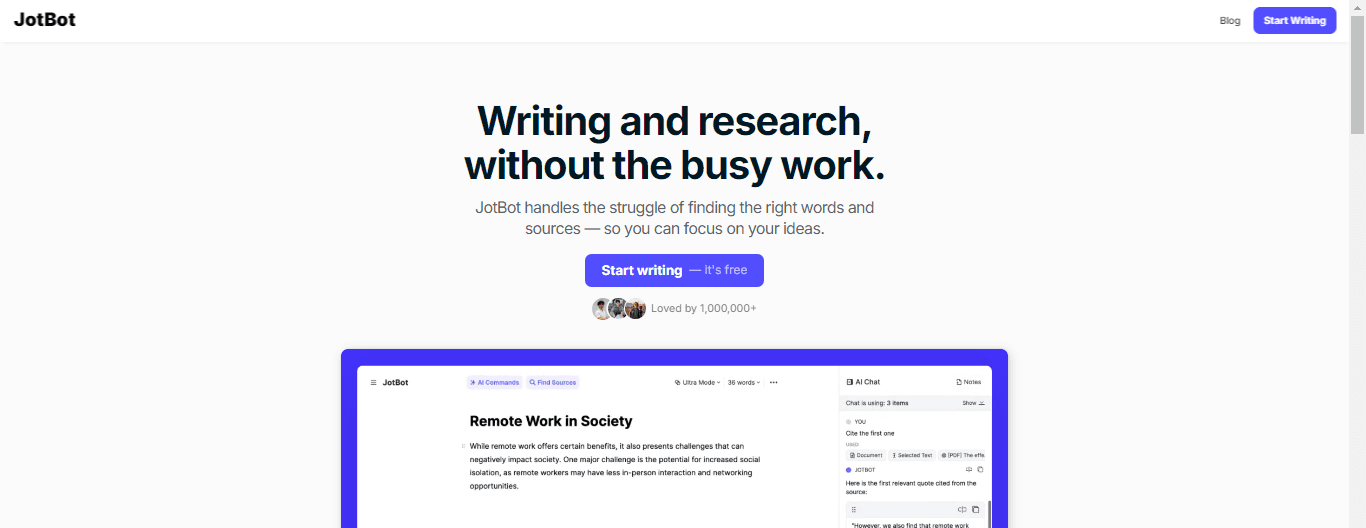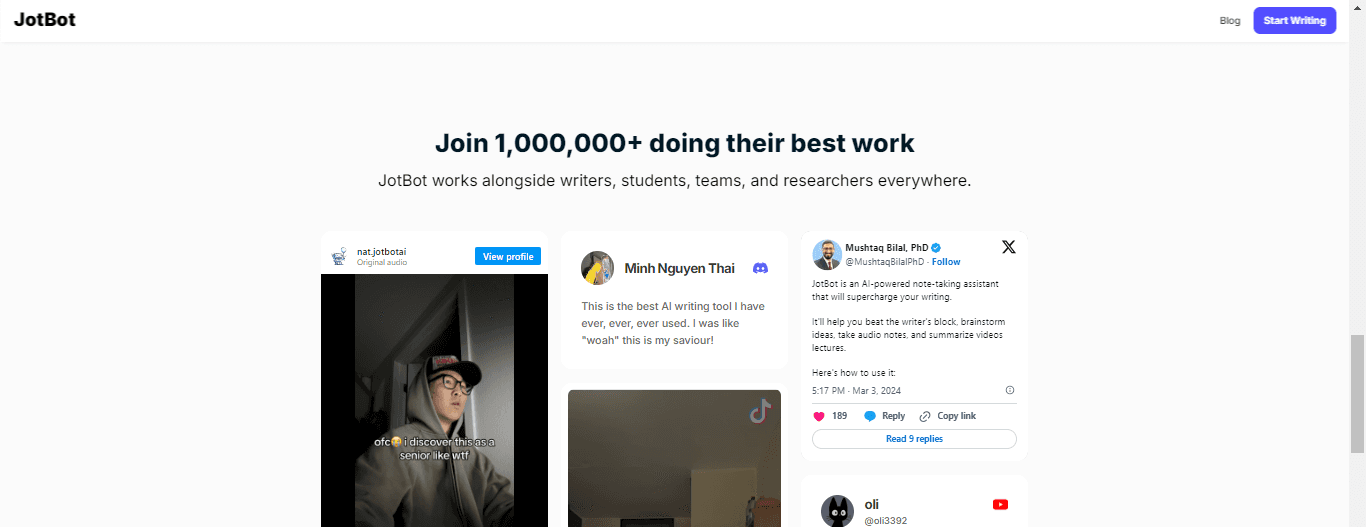< Back
Some Best Examples of Peer Reviewed Sources (With Tips On How to Use Each One)
Declan Gessel
Oct 6, 2024
Consider you've got an essay due, and Google's throwing everything but the kitchen sink at you. We've all been there, scrambling to find a credible source to save the day. That's where peer-reviewed articles come in. They're the gold standard for reliable research, but spotting them can be tricky when you're knee-deep in the digital info dump. Fortunately, this guide will give you some solid examples of peer-reviewed sources, find sources for essay AI, and show you how to use them effectively. Whether a student or researcher, you'll find this information invaluable.
With tools like Jotbot's source finder, you'll breeze through the chaos and get the quality research you need for your essays.
Table Of Contents
How To Determine the Best Peer-Reviewed Sources for Your Research
Common Challenges with Peer-Reviewed Sources and How to Overcome Them
Write Smarter With Jotbot's Source Finder — Start Writing for Free Today
What are Peer Reviewed Sources?

Peer-reviewed sources are the backbone of academic research. Experts have rigorously evaluated These scholarly articles, studies, and publications before publication. This evaluation ensures the research is original, significant, and methodologically sound. When you cite peer-reviewed sources, you’re relying on validated information that you can trust.
How the Peer Review Process Works
The peer review process is meticulous. First, researchers submit their manuscript to a journal. The editor then assigns it to independent reviewers. These reviewers evaluate the manuscript for originality, significance, and clarity. Authors may need to revise their work before it’s accepted for publication. This process weeds out low-quality research and helps authors improve their findings.
Why Peer-Reviewed Sources Matter
These sources are crucial for several reasons. They add credibility and trust to your work. The rigorous nature of peer review ensures high standards and academic rigor. Peer-reviewed articles often present original research, sparking new ideas and directions. Engaging with this literature allows diverse perspectives and a deeper understanding of your field.
Looking for a tool to help with your writing? Jotbot's AI writing assistant can find sources, take notes, summarize videos, and write essays. Write more competent, simple enough. Start finding sources that are accessible with Jotbot's source finder today. Sign in with Google and get started in seconds.
Related Reading
• How To Find Good Sources
• Using AI For Research
• Citing ChatGPT
• How To Find Academic Sources
• How To Cite AI In MLA
• AI For Research Paper Writing
• Essay Sources
• AI In Academic Writing
• Most Reliable Sources For Research
• How To Get ChatGPT To Cite Sources
Types of Peer-Reviewed Sources

Journal Articles: The Backbone of Academic Research
Journal articles are the mainstay of academic research, presenting original studies and theoretical discussions. They undergo rigorous peer review to ensure validity. Publications like The Journal of the American Medical Association (JAMA) and Nature are known for their strict standards. Pay attention to the publication date when using journal articles to ensure the information is up-to-date.
Conference Proceedings: Where Innovation Begins
Conference proceedings compile papers presented at academic conferences. They showcase current research that may still need to be published in journals and provide insights into emerging trends. For example, the IEEE International Conference on Computer Vision proceedings often feature innovative research. Always corroborate the information with peer-reviewed articles, as the studies presented may be preliminary.
Books and Monographs: Comprehensive Coverage
Scholarly books present in-depth explorations of topics and undergo peer review before publication. They can provide comprehensive coverage of a subject area. The Oxford Handbook of Political Science, for example, features contributions from experts and is thoroughly vetted. Check the publisher’s reputation and the authors' qualifications to assess reliability.
Dissertations and Theses: Original Ideas
Dissertations and theses are extensive research projects submitted by graduate students. Many universities have repositories for these works, which can provide valuable insights. For example, A doctoral dissertation exploring climate change's effects on agriculture can be a rich data source. Always cross-reference their findings with published literature to ensure accuracy.
Review Articles: A Bird’s-Eye View
Review articles summarize and synthesize existing research on a specific topic. They highlight trends, gaps, and future directions. For example, a review article on educational interventions can provide a comprehensive overview of the research landscape. Use review articles to familiarize yourself with a topic and to identify critical studies for deeper exploration.
Systematic Reviews and Meta-Analyses: The Gold Standard
Systematic reviews and meta-analyses compile data from multiple studies, drawing broader conclusions. They follow strict methodologies to ensure reliability. A systematic review examining hypertension medications, for example, provides evidence-based insights. Prioritize these sources when seeking reliable information.
Jotbot is your go-to AI writing assistant for finding sources. Write more competently, not harder, with Jotbot's AI writing assistant. Start finding sources that are accessible with Jotbot's source finder today. Sign in with Google and get started in seconds.
Related Reading
• Best AI Tool For Research
• Reference Finder
• Best AI For Research
• How to Cite AI
• AI For Literature Review
• Websites Like Google Scholar
• AI That Cites Sources
• Best Academic Search Engines
• Academic Research Software
• How To Use Chat GPT For Research
• Best Research Tools For Students
How to Identify Quality Peer-Reviewed Sources

Spotting Stellar Journals: Reputation Matters
Start by checking the journal's credibility. An excellent way to do this is by looking at its impact factor, which shows how often its articles get cited. Journals with higher impact factors are usually more respected. Also, the journal should be indexed in reputable databases like PubMed or Scopus. This typically means the journal has high standards for publication. For instance, journals like Nature and The New England Journal of Medicine are well-known for their rigorous peer-review processes.
Trust the Experts: Author Credentials Count
Next, look at the author’s credentials. Do they have advanced degrees or affiliations with respected institutions? This can lend credibility to their work. It’s also worth checking their publication history. Authors with multiple peer-reviewed articles are generally more credible. These details can give you confidence in the quality of the research.
Methodology Matters: Scrutinize the Research Process
A solid research article should clearly explain how the study was conducted. Check for transparency in the methodology, including sample size and data collection techniques. If others can replicate the research, that’s a good sign of a robust method. This is crucial for assessing the validity of the study.
Results that Resonate: Analyzing Research Findings
Take a close look at the study’s results and discussion sections. The findings should be clear, and the discussion should connect them to existing literature. Be cautious of sources that make broad claims without supporting evidence. Articles that cite other peer-reviewed studies enhance their credibility by situating their findings within the wider academic discourse.
Double-check with Reviews and Critiques
Consider looking for reviews or critiques of the research. Meta-analyses and systematic reviews are particularly valuable, as they aggregate findings from multiple studies and provide a comprehensive topic overview. Sometimes, peer-reviewed articles receive critiques in subsequent publications. Examining these can give a more balanced perspective on the research.
Use the Right Tools: Academic Databases and Reference Managers
Don’t forget to make use of academic databases and tools. Search engines like Google Scholar, JSTOR, or specialized databases in your field can help you find peer-reviewed articles. Reference management tools like Zotero or Mendeley can help organize and assess your sources' relevance. These tools can make the research process more efficient and effective.
The Importance of Using Peer-Reviewed Sources

Ensuring Credibility and Accuracy
Why does the credibility of your sources matter? Peer-reviewed articles go through a strict evaluation by experts. They check the facts and standards. Think about fields like medicine. Mistakes can have serious consequences. Using reliable, peer-reviewed research ensures your sources are well-vetted and accurate. This boosts your work's credibility, showing readers or peers that you've done your homework.
Building on Established Knowledge
How can you build your research on solid ground? Peer-reviewed sources often rely on past research, contributing to the field's body of knowledge. By referencing these materials, you engage with established findings. For example, in climate change research, you need peer-reviewed articles summarizing decades of study. Engaging with reliable data not only adds credibility to your work but also sparks new ideas for inquiry.
Contributing to Academic Integrity
How does using peer-reviewed sources reflect academic integrity? Citing these sources shows good educational practice and integrity. It indicates your commitment to high-quality, reliable information. Many universities use plagiarism detection software that cross-references peer-reviewed journals. Using these sources helps protect your work from criticism and reinforces ethical standards.
Staying Updated with Latest Research
Why is it essential to keep up with the latest research? Peer-reviewed journals often lead in fast-evolving fields like technology and medicine. A researcher studying AI needs peer-reviewed sources to stay informed about the latest advancements. With them, you might get key developments. By using these sources, you ensure your work is relevant and cutting-edge.
Developing Critical Thinking Skills
How can engaging with peer-reviewed research improve your critical thinking? Analyzing these articles requires you to engage critically with complex data and interpretations. In fields like psychology, it's crucial to evaluate the limitations of studies. What biases might the authors have? What alternative interpretations are possible? Engaging critically with peer-reviewed sources strengthens your analytical skills and helps you become a more discerning researcher.
Tips for Using Peer-Reviewed Sources Effectively

Boost Your Argument with Peer-Reviewed Sources
Peer-reviewed sources are your best allies in building a solid argument. They lend credibility and authority to your claims. When you use them, highlight the connection between the source’s findings and your argument. Summarize the study’s key points and show how they align with your position.
This strengthens your case and demonstrates a deep understanding of the topic. For example, if you emphasize personalized education’s benefits, referencing a study showcasing improved student outcomes from individualized learning can be a game-changer.
Put on Your Critical Thinking Cap
Not all peer-reviewed sources are created equal. Although they’re generally high-quality, assessing their conclusions critically is crucial. Look for potential flaws, such as small sample sizes or questionable methodologies. By pointing out these limitations, you’re not just showcasing your analytical skills—you’re also enhancing the credibility of your work.
Suppose a dietary study claims specific health benefits but has a small, homogenous sample. This is your chance to discuss these limitations while still incorporating the findings.
Achieve Balance with Diverse Sources
Using multiple peer-reviewed sources is essential for a well-rounded discussion. Don’t just rely on a single perspective. Aim for a balanced view by including studies with different viewpoints or covering various aspects of the same issue. For instance, environmental science and economics research should be integrated when writing about climate change to present a comprehensive understanding.
Spread the Love: Don't Lean on One Source
Relying too much on one study can undermine your work. Even if a study seems perfect, it’s vital to incorporate a range of sources. This approach helps you avoid bias and enriches your discussion with unique insights. If one article highlights a teaching method’s benefits, complement it with studies exploring different contexts or long-term effects.
Paraphrase, Don't Over-Quote
While direct quotes can be impactful, they should be used sparingly. Paraphrasing shows you understand and can analyze the material. Save direct quotes for groundbreaking theories or pivotal findings. Otherwise, reword critical points to create a more engaging and original narrative.
Jotbot can be your go-to AI writing assistant for those looking to streamline their writing process. Its robust features, Jotbot can help you find sources, take notes, and even draft essays. Write more competently, not harder, with Jotbot's AI writing assistant. Start finding sources that are accessible with Jotbot's source finder today. Sign in with Google and get started in seconds.
How To Determine the Best Peer-Reviewed Sources for Your Research

Pinpoint Your Research Topic and Questions
Getting started requires a clear understanding of what you're researching. Begin by refining your topic and questions. This is your roadmap, steering you toward literature that answers your queries. Jot down keywords or phrases that define your topic. These will act as your compass when searching for sources.
Hit Up the Right Academic Databases
Once you know your direction, head to academic databases. Platforms like JSTOR, PubMed, Google Scholar, and Scopus are treasure troves of peer-reviewed articles across various fields. Get comfortable with their advanced search features. You can filter by date, subject, and article type to get precisely what you need.
Check the Journal’s Impact Factor
Not all journals are created equal. The impact factor tells you how often articles from a journal are cited. The higher the number, the more influential the journal. Aim for sources from journals with high-impact factors. They usually have rigorous review processes and are respected in the academic world. Think of journals like Nature or The New England Journal of Medicine.
Scrutinize Author Credentials
Who’s behind the research matters. Look into the authors’ qualifications and affiliations. Authors with a strong background and a history of publications in your area can lend credibility to the work. A quick background check on university profiles or professional sites can provide this info.
Skim Abstracts and Conclusions First
Don’t waste time on a whole article if it’s not relevant. Start with the abstract and conclusion. These sections give a snapshot of the research question, methods, and findings. If they align with your needs, dive deeper into the article.
Explore Citations and References
Peer-reviewed articles are often rich with citations of other significant studies. The reference list can serve as a gateway to other high-quality sources. Check how these works support or contrast with the article's conclusions.
Jotbot is your personal document assistant and source finder. It excels in AI note-taking, AI video summarizing, AI citation/source finder, and more. Join 500,000+ writers, students, teams, and researchers using Jotbot to write more, write better, and write faster with Jotbot's AI writing assistant. Write more competently, not harder, with Jotbot's AI writing assistant. Start finding sources that are accessible with Jotbot's source finder today. Sign in with Google and get started in seconds.
Common Challenges with Peer-Reviewed Sources and How to Overcome Them

Breaking Through the Paywalls
Many of the best peer-reviewed sources are locked behind paywalls, making getting them without a subscription challenging. But you’ve got options. Check out your local or university library; they often have the keys to these locked doors through database access. Platforms like ResearchGate and Academia.edu sometimes offer free versions of papers. And don’t forget about preprint archives, which host early versions of documents before official publication.
Drowning in a Sea of Studies?
The sheer volume of peer-reviewed articles can be dizzying. You can navigate this by using specific keywords and phrases in your searches. Filters in academic databases are your friends. You can sift through the noise with clear parameters and zero in on what truly matters.
Cracking the Code of Academic Jargon
Academic articles often read like they’re written in a foreign language. When you’re puzzled by jargon, familiarizing yourself with standard terms in your field can make a big difference. Online glossaries and writing guides can help, too. If you’re stuck, check out secondary sources that break down complex ideas into simpler terms.
Not All Journals Are Created Equal
Some journals are top-notch, while others might cut corners. Before diving into an article, look at the journal’s reputation. Impact factors and where a journal is indexed can give you clues about its quality. Sticking to well-known publications in your field usually means reading high-quality research.
Spotting Bias in Research
Even top-tier research can have biases. They might come from funding sources or personal perspectives. Be critical of what you read. Check for conflicts of interest and look at the bigger picture by consulting multiple sources. This way, you get a more balanced perspective.
Keeping Up with the Latest
Research moves fast, and staying updated is a challenge. Set up alerts for your topics in academic databases. Following leading journals and subscribing to newsletters can keep you in the loop. Regularly checking these resources ensures you don’t miss out on new findings.
Write Smarter With Jotbot's Source Finder — Start Writing for Free Today

Jotbot is more than just another AI tool — it's your ultimate writing companion for research and composition. From AI note-taking and video summarizing to a source finder and essay writer, Jotbot has you covered. It’s designed to assist students, researchers, and teams to write more intelligently, not harder. With Jotbot, finding peer-reviewed sources becomes a breeze. Sign in with Google, and you’ll be sifting through scholarly articles and journals in seconds.
Find Your Sources with Ease
Writing a research paper or essay often starts with finding credible sources. Jotbot's AI source finder simplifies this process by guiding you to scholarly databases and journals. You can pinpoint peer-reviewed articles, academic papers, and professional studies. This means you can focus on crafting an insightful argument rather than getting lost in a library database.
AI-powered note-taking and Summarizing
Gone are the days of scribbling down notes or pausing videos every few seconds. Jotbot’s AI note-taking and summarizing tools help you capture key points from lectures, books, and videos. Just upload your content, and Jotbot will deliver concise, organized notes highlighting the most critical information. This frees you up to engage with the material rather than transcribing it.
AI Outlines and Essay Writing
Once you’ve gathered your sources and notes, Jotbot can help you organize your thoughts with AI-generated outlines. With a clear roadmap, you can start writing with confidence. Jotbot enables you to craft your essay's body, ensuring each paragraph is well-structured and logically flows. Whether you’re writing a literary analysis or a scientific report, Jotbot makes it easier to put your ideas on paper.
Join the Jotbot Community

Jotbot is trusted by over 500,000 writers, students, and researchers worldwide. They rely on AI tools to improve their writing process and produce high-quality work. Whether crafting a blog post, writing a research paper, or drafting a business proposal, Jotbot is there to help you succeed. So why wait? Start finding sources and writing better essays today with Jotbot's AI writing assistant.
Related Reading
• List of Scholarly Sources
• How to Find Scholarly Sources
• Academic Sources Examples
• Scholarly Sources Examples
• Sourcely
• AI Research Tools
• Elicit AI
• Scisummary
• Scholarcy AI
• Consensus AI Tool
• Mendeley Alternatives
• Cite This For Me Alternative
• How to Cite a Book
• How to Cite an Article
• How to Cite
• How to Cite a PDF
• How to Cite Multiple Authors MLA
• How to Cite a Website in Text
• How to Cite a Lecture
• How to Cite ChatGPT
Write more, better, faster.
Your personal AI document assistant












